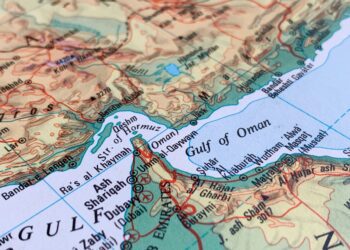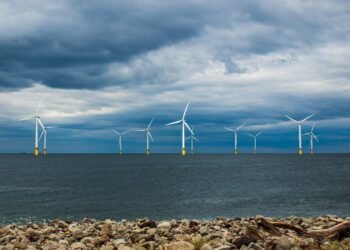“Ramp it up” and “deliver us from this nightmare.”
That’s the message Peter Thomson, the United Nations’ Special Envoy for the Ocean and and Co-Chair of Friends of Ocean Action, is sending to global leaders as they head to a crucial climate summit in November.
Detailed plans to cut greenhouse gas emissions and concrete commitments to invest in a sustainable blue economy are what’s needed to slow the decline in ocean health and put a brake on human damage to the planet, he said.
“You can’t have a healthy planet without a healthy ocean,” Thomson said. “The big emitters have to face up to the fact that they are poisoning us all. They are the ones who have to take the lead on drastically cutting their emissions.”
Thomson, whose home nation of Fiji is under threat from rising sea levels and ocean temperatures, spoke in an interview with the World Economic Forum.
Climate code red
His comments came after a major report from the UN’s Intergovernmental Panel on Climate Change confirmed ongoing changes to the ocean, including warming, more frequent marine heatwaves, acidification and reduced oxygen levels. The wide-ranging assessment of human impact on the planet said climate change is widespread, rapid and intensifying. UN Secretary General António Guterres called it a “code red for humanity.”
“The report is a huge alarm call for us all,” Thomson said. “From the ocean’s perspective, everything is connected. Think of it as one bathtub. So, what’s flowing off the Greenland ice sheet is causing a rising sea level in an atoll republic. If you’re burning coal to get your electricity, you’re contributing to the drowning of an age-old island culture.”
Once a support for the planet as a key absorber of carbon, the ocean is now at grave risk.
Warming, acidification, deoxygenation, changing circulation patterns and rising sea levels threaten marine life and ecosystems and put at risk the future ability of the seas to indirectly support life on Earth, Thomson said.
“We can see there are going to be increasing marine heatwaves and this, along with acidification, really puts the survival of tropical coral reefs in particular into jeopardy,” he said.
Ocean ecosystems at risk
Coral reefs are among the ecosystems with the highest biodiversity on the planet and are home to more than a quarter of all marine life. The IPCC said coral reefs would decline by 70-90% with global warming of 1.5°C and virtually all would be lost with 2°C.
Limiting warming to close to 1.5°C or even 2°C will be beyond reach in the next decades unless there are immediate, rapid and large-scale reductions in greenhouse gas emissions, the IPCC said, underscoring the severity of the prognosis for coral reefs and other marine life.
A major climate summit, COP26, is due to take place on 1-12 November at the Scottish Event Campus in Glasgow. The UK and Italian governments, as co-hosts, have set four goals: agreeing to a step change in commitments to emissions reduction, strengthening adaptation to climate change impacts, getting finance flowing for climate action, and enhancing international collaboration on energy transition, clean road transport and nature.
The IPCC report “really ratcheted up the responsibility of COP26,” Thomson said.
Financing a sustainable ocean
As well as committing to real reductions in human-generated carbon emissions, policymakers and leaders need to direct more climate finance to the sustainable blue economy, which Thomson said are “hugely underfunded” when compared to the amount of investment in terrestrial projects.
“The sustainable blue economy is our future,” he said. “That’s where we’re going to get our future security of nutrition, healthy nutrition; that’s where we’re going to get our energy: from offshore wind and tidal energy. But we’re not investing in it.”
More needs to be spent on offshore wind projects, the greening of shipping, moving to green hydrogen from fossil fuels, and scaling up sustainable aquaculture that doesn’t disrupt ecosystems, pollute or damage biodiversity, Thomson said.
“We have to start spending the money,” he said. “Government leaders have to step up. Government action is required to make renewable energy the way we go forward.”
Friends of Ocean Action
Thomson also co-chairs the World Economic Forum’s platform Friends of Ocean Action, bringing together more than 65 leaders from a range of sectors around the world to fast-track solutions for a healthy ocean. The network argues that the knowledge, power and technology to put the ocean on a path to recovery is there and needs to be put into action.
One of the World Economic Forum’s UpLink streams is focused on innovating new models for ocean and ecosystem restoration, protection and financing.
Everyone can get involved in the United Nations’ Development Goal 14, conserving and sustainably using the ocean, seas and marine resources, Thomson said, by cutting emissions, fishing sustainably and picking pollution up from beaches.
“There’s so much that people can do, my message would be: get involved and do the right thing,” he said. “And certainly, you don’t have to be an optimist, but you can be a pragmatist.”
He also had a message for world leaders, policy makers and officials as they digest the IPCC report and prepare to head to Glasgow:
“Whatever your ambition was before the IPCC report, ramp it up,” he said. “This is the best of science available. So whatever your ambition was, prior to this report, ramp it up and come to Glasgow, with much more ambitious plans in your head. And if you don’t, you are not being faithful to the grandchildren of your country.”
By Emma Charlton
About the author: Emma Charlton is Senior Writer, Formative Content at the World Economic Forum.
This article originally appeared at https://www.weforum.org/agenda/2021/08/climate-crisis-oceans-peter-thomson-un/ and is republished with permission.












